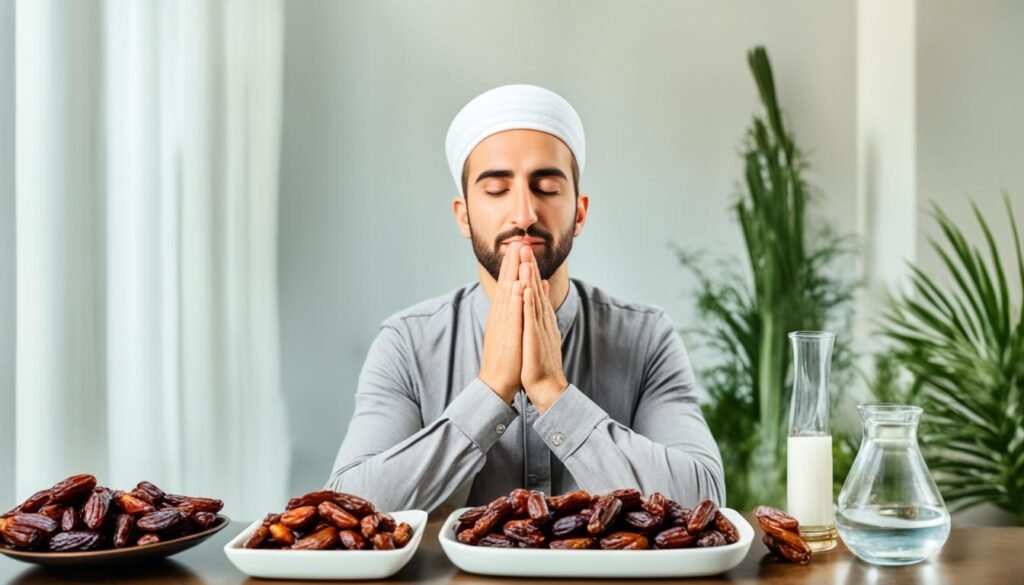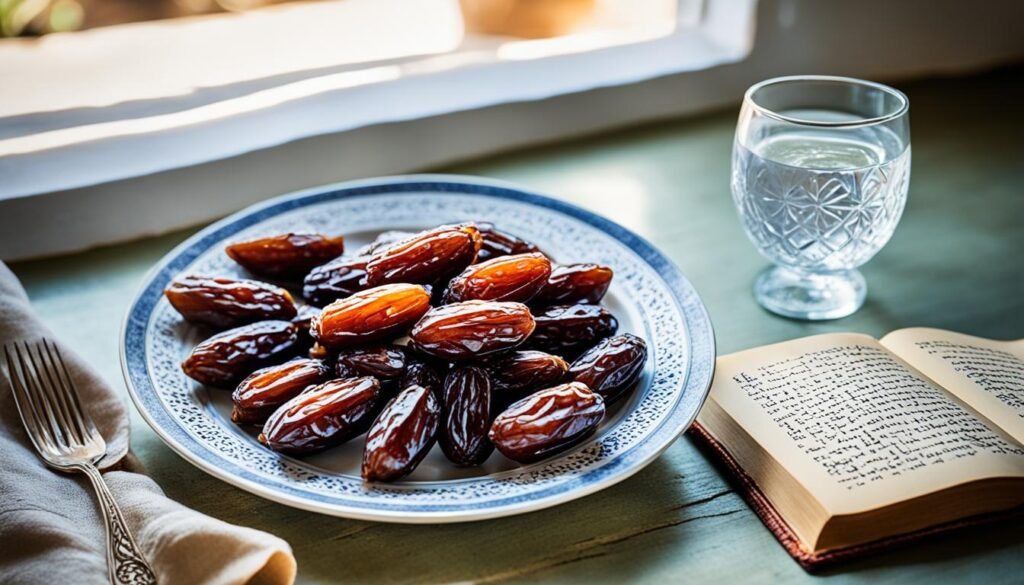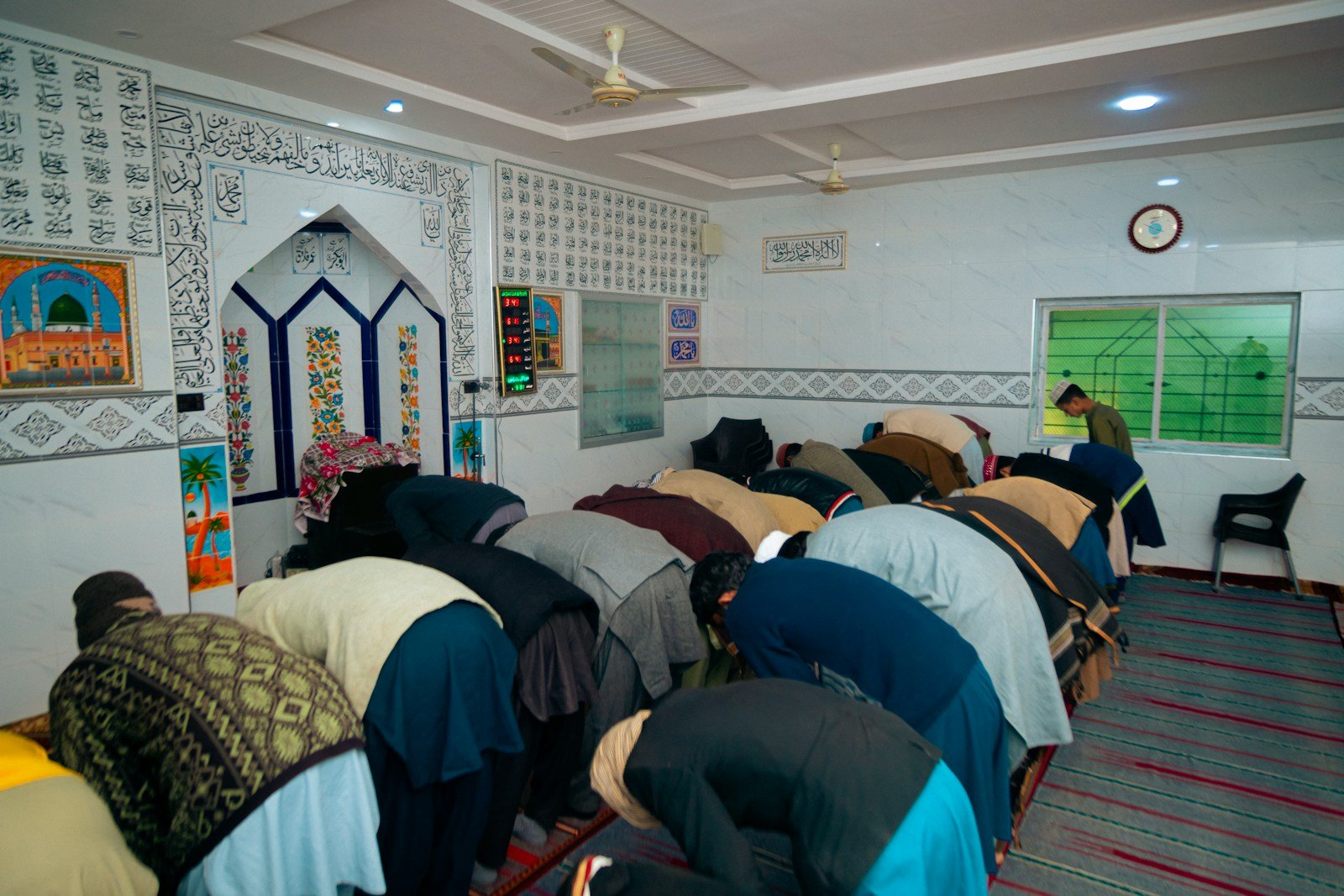Have you ever thought about how saying a dua while breaking your fast changes your spiritual journey in Ramadan? As millions look forward to their iftar, the act of making a dua becomes a key moment. It connects us deeply with the divine. This Ramadan dua is more than just a ritual. It’s a way to ask for Allah’s mercy and blessings.
We will look into how saying a prayer can deeply affect us. Especially in Ramadan, every moment is filled with spiritual meaning. This makes the dua for breaking fast very special.

Understanding the Importance of Dua in Ramadan
In Ramadan, the role of dua is huge. It’s a way to talk to Allah and rely on His guidance. Dua is key to Islamic worship, making faith stronger and deepening spiritual connection.
The Role of Dua in Islamic Worship
Dua connects the believer with Allah. It includes personal prayers and group prayers. By making dua, people share their hopes and fears, making their spiritual journey richer in Ramadan.
Benefits of Making Dua During Fasting
Fasting is more than just not eating or drinking. Dua during fasting brings spiritual growth and gratitude. It helps believers feel closer to Allah. Their prayers are seen as more sincere when they are made during fasting.
Dua For Breaking Fast Ramadan
Breaking the fast during Ramadan is a sacred moment, filled with deep spiritual meaning. Saying the recommended dua deepens this connection to Allah. It makes the experience more meaningful.
Recommended Dua for Breaking Fast
The most recommended dua for breaking fast is a heartfelt prayer:
Allahumma inni laka sumtu wa ala rizq-ika-aftartu.
This means “O Allah! For You I have fasted and upon Your provision have I broken my fast.” It shows thanks and recognizes Allah’s blessings. It’s a key part of the fasting dua.

Timing of the Dua: Best Moments to Invoke
When you say the dua matters a lot. The best times are right after sunset when you break your fast. Also, during quiet moments before the evening prayer. These times help you connect deeply with the divine.
The Prophet’s Guidance on Breaking Fast
Breaking fast during Ramadan is deeply spiritual, thanks to the Prophet Muhammad’s teachings. He stressed the role of dua in this moment. It’s a time to ask for help and connect with Allah.
Hadith on the Importance of Dua
Many hadiths show how crucial dua is during iftar. The Prophet taught that these prayers are highly valued and never ignored. This shows the importance of dua in hadith. Each prayer makes breaking fast a moment of deep reflection and true request.
Spiritual Significance of Breaking Fast
Breaking fast is more than ending hunger. It’s a time of thanks and looking back on one’s spiritual path. It’s a chance to focus on the Divine, asking for guidance and support. This act lets Muslims show the spiritual significance of their faith.
The Prophet said the dua of a fasting person goes up to the heavens. This confirms the deep connection made during iftar.

For those wanting to improve their iftar, learning more about the right dua is helpful. Check out this resource to learn more and deepen your connection during this time.
Examples of Dua for When Breaking Fast
During Ramadan, breaking the fast is a deeply spiritual act. Saying specific Arabic dua phrases makes this moment more meaningful. It connects our physical act of eating with our spiritual growth. Here are some important dua Muslims say during iftar, deepening their bond with Allah.
Key Arabic Phrases and Their Meanings
“Dhahaba al-zama’ wa abtalat al-‘urooq wa thabata al-ajr in sha Allah.” This means “Thirst is gone, the veins are moistened, and the reward is certain if Allah wills.” It’s about more than just ending the fast. It’s about feeling fully satisfied in body and soul. Saying this dua shows thanks and highlights the spiritual side of fasting.
Dua from Hadith: Dhahaba al-zama’ wa abtalat al-‘urooq
Reciting “Dhahaba al-zama’ wa abtalat al-‘urooq” during iftar adds depth to the fasting experience. It reminds us of Allah’s mercy and blessings. By saying these dua every day, believers can grow spiritually while keeping their fasting promise.
Additional Duas to Consider During Ramadan
Ramadan is a time for spiritual growth. Making extra duas deepens this experience. Saying a family dua strengthens family bonds. The Laylat-al-Qadr dua is for reflection and asking for mercy. Both are important during this holy month.
Dua for Family and Friends
Asking for a family dua brings peace and happiness home. It’s key to pray for blessings on loved ones for their comfort and right path. These prayers help build stronger family ties and emotional support.
Dua for Laylat-al-Qadr: A Special Invocation
The Laylat-al-Qadr dua makes prayer more powerful on a special Ramadan night. This night is very important, offering a chance for forgiveness and mercy. Saying this invocation reminds us of Allah’s endless kindness, bringing comfort and spiritual refreshment.
Tips for Effective Dua During Ramadan
Practicing effective dua during Ramadan can make your spiritual journey better. Using strategies like making a dua list and memorizing duas helps you connect more deeply. It also keeps your focus sharp during prayer.
Creating a Dua List
A dua list is a great way to stay focused during Ramadan. It lets you list your specific wishes and hopes. This way, you won’t forget anything important you want to ask for.
Writing these down helps you stay consistent. It also makes your thoughts clear and organized.
Memorizing Important Duas
Memorizing important duas is very useful. It lets you say them easily in different situations. Using dua cards, placed around your home, can remind you to pray regularly.
These tips can turn your daily prayers into something more meaningful during Ramadan.
The Psychological Benefits of Making Dua
Making dua is a powerful way to connect with our spirituality. It lets us reach out to a higher power and share our needs or feelings. This practice boosts our mental health, making us feel grateful and patient.
Connection to Spirituality
When we make dua, we take part in a meaningful act that touches our spiritual core. It makes us feel part of a big community of believers, strengthening our faith. Regularly doing this, we see the mental benefits of dua, feeling more spiritually rich and emotionally stable.
Fostering Gratitude and Patience
Practicing dua often helps us grow qualities like gratitude and patience. Waiting for answers teaches us to trust Allah’s timing and wisdom. This builds inner peace, helping us handle life’s stresses better. By embracing the benefits of dua, we see the world in a more positive light.
Ramadan: A Time for Reflection and Community
Ramadan reminds us of the power of community and the bonds that connect us. Families and friends come together to break their fast, creating a sense of shared purpose. This time is filled with reflection during Ramadan.
The Power of Shared Dua During Iftar
Sharing dua during iftar strengthens relationships and deepens the spiritual journey of those involved. When people pray together, they feel a strong sense of unity. This shows the true meaning of community.
Community Support and Charity
Ramadan highlights the importance of community support. Charity and kindness are key during this month, building a strong social network. The act of giving, inspired by shared prayers, motivates people to help those in need. This strengthens bonds of compassion and solidarity.
Encouraging Kids to Participate in Dua
Getting kids to join in on dua during Ramadan is key for their spiritual growth. By taking part in traditional prayers, kids learn important values and feel a sense of duty towards their faith. This helps them connect with their cultural roots and see spirituality as a big part of their life.
Teaching kids dua can be fun and engaging. Families can pick meaningful duas that they like, making learning fun and interactive. Celebrating when kids learn a new dua strengthens family bonds during Ramadan.
Parents can guide kids through making dua, teaching them important prayers and deepening their faith understanding. This shared experience leads to deep talks and reflections on spirituality. It makes kids feel they belong and are connected to their Islamic beliefs.
FAQ
What is the significance of making dua during Ramadan?
What are the benefits of making dua while fasting?
What is the recommended dua for breaking fast?
When is the best time to make dua while breaking the fast?
How do hadith highlight the importance of dua at iftar?
What are some key Arabic phrases for dua at iftar?
What duas can be made for family during Ramadan?
What dua is recommended for Laylat-al-Qadr?
How can one effectively create a dua list for Ramadan?
What are the psychological benefits of making dua during Ramadan?
How does shared dua during iftar benefit the community?
How can parents encourage their children to participate in dua?

Embracing Faith, One Insight at a Time!
The teachings of the Quran have always guided my path. With a deep passion for Islamic knowledge, I strive to blend the wisdom of tradition with the relevance of today, making the timeless messages of Islam accessible and meaningful for everyone.
Muslim Culture Hub is my platform to share historical insights and thought-provoking articles, exploring both well-known and lesser-discussed aspects of Islamic culture and beliefs. My mission is to create an inclusive online space where everyone can learn, strengthen their faith, and connect with the profound message of Islam.
Join the journey!
May peace be upon you.








